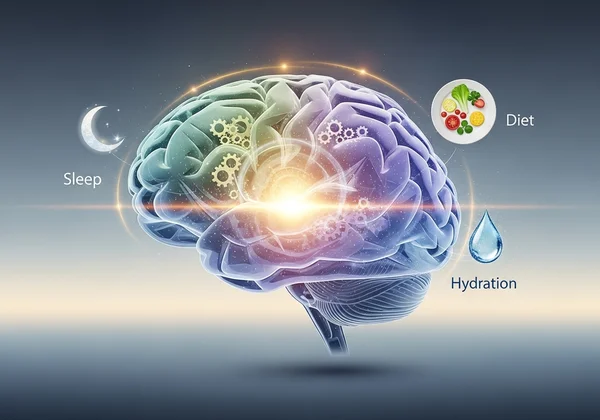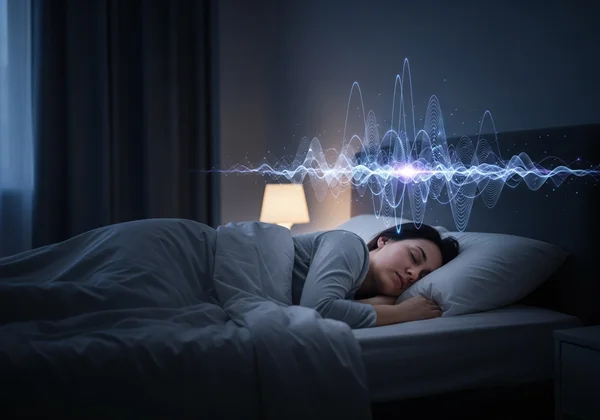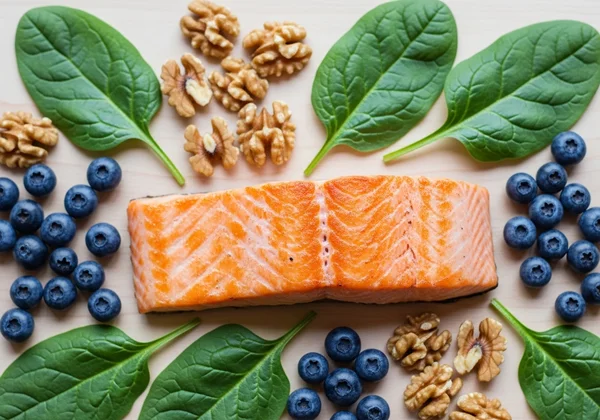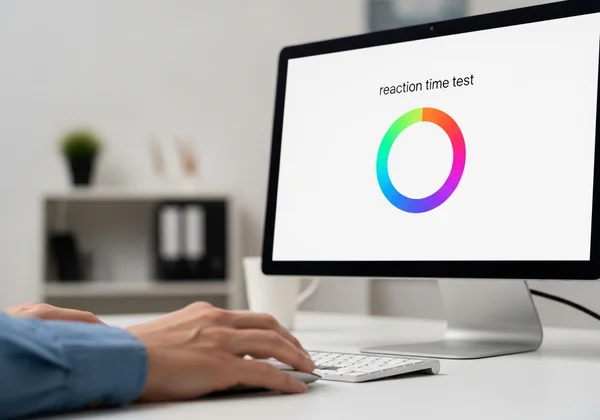Boost Your Reaction Time for a Faster Reaction Speed Test: A Guide to Sleep, Diet & Hydration
July 21, 2025 | By Marcus Adler
Ever wonder why some days you feel lightning-fast and mentally sharp, while on other days, you feel sluggish and a step behind? Your reaction time isn't just a fixed genetic trait; it's a dynamic measure of your cognitive performance, deeply influenced by your daily habits. This guide explores the "silent saboteurs" and powerful allies of your reflexes: sleep, diet, and hydration. What commonly causes slow reaction time? Often, the answer lies in these fundamental lifestyle factors.
Understanding how to manage them is key to unlocking your full potential. Whether you're a competitive gamer chasing esports glory, an athlete seeking a performance edge, or simply someone dedicated to maintaining cognitive health, optimizing these areas is crucial. Before we dive in, why not establish a baseline? You can take our free reaction time test to see where you stand right now.

The Critical Link: Sleep and Your Reaction Time
Sleep is not a passive state of rest; it is an active period of intense neurological maintenance. During sleep, your brain consolidates memories, clears out metabolic byproducts, and repairs neural connections. This process is absolutely essential for maintaining sharp reflexes and quick decision-making. When you shortchange sleep, you directly impair your brain's ability to function at peak capacity.
Why Quality Sleep Boosts Reflexes
Quality sleep acts as a performance enhancer for your nervous system. Deep sleep cycles are when your brain strengthens the neural pathways responsible for motor skills and memory. Think of it as your brain’s dedicated training session, where it practices and refines the connections between seeing a stimulus and triggering a physical response. A well-rested brain can process information faster, anticipate events more accurately, and execute commands with greater speed and precision. This translates to faster clicks in a game, a quicker start off the blocks, or a swifter response on the road.
How Sleep Deprivation Slows You Down
Sleep deprivation is one of the most significant factors that causes slow reaction time. Even a single night of poor sleep can slow your responses to the level of someone who is legally intoxicated. Lack of sleep leads to lapses in attention, reduced cognitive processing speed, and impaired judgment. Your brain's prefrontal cortex, which governs executive functions like decision-making, is particularly vulnerable. This means you not only react slower but also make poorer choices under pressure. If you've ever felt like you're moving through mud after a sleepless night, that's your reaction time taking a direct hit.

Practical Tips for Optimal Sleep to Improve Reaction Speed
To harness the power of sleep, focus on consistency and quality. Creating a sleep-conducive environment is a powerful way to improve reaction time.
- Stick to a Schedule: Go to bed and wake up around the same time every day, even on weekends. This regulates your body's internal clock.
- Create a Restful Environment: Keep your bedroom dark, quiet, and cool. Avoid screens (phones, tablets, TVs) for at least an hour before bed, as the blue light can disrupt melatonin production.
- Avoid Stimulants: Steer clear of caffeine and nicotine in the late afternoon and evening. While alcohol might make you feel drowsy, it disrupts deep sleep cycles later in the night.
- Mindful Relaxation: Incorporate a relaxing pre-sleep ritual, such as reading a book, light stretching, or meditation, to signal to your body that it's time to wind down.
Fueling Your Brain: Diet's Role in Reaction Speed
Your brain is a high-performance engine that consumes about 20% of your body's total energy. The fuel you provide it through your diet directly impacts its function, including your reaction speed. A diet lacking in essential nutrients can leave your brain sluggish and inefficient, while a well-balanced, nutrient-rich diet can sharpen your focus and accelerate your response times. After optimizing your diet, you can measure your reaction speed to track the difference.
Nutrients for Peak Cognitive Performance
For peak cognitive performance, certain nutrients truly shine. Omega-3 fatty acids, found in fatty fish like salmon, are critical for building and maintaining brain cells. Antioxidants, abundant in berries, leafy greens, and dark chocolate, protect the brain from oxidative stress, which can degrade cells over time. B vitamins play a vital role in energy production and the synthesis of neurotransmitters. Ensuring your diet includes these powerhouses is a direct investment in your mental quickness.
Foods to Embrace (and Avoid) for Sharper Reflexes
For sharper reflexes, focus on incorporating whole, unprocessed foods into your daily meals.
- Embrace:
- Leafy Greens: Spinach and kale are packed with brain-boosting nutrients like lutein and folate.
- Berries: Blueberries, in particular, are known for improving cognitive function.
- Nuts and Seeds: Walnuts and flaxseeds are excellent sources of Omega-3s.
- Lean Proteins: Chicken and fish provide the amino acids needed for neurotransmitter production.
- Avoid:
-
Sugary Drinks and Snacks: These cause sharp spikes and crashes in blood sugar, leading to mental fog.
-
Processed Foods: Often high in unhealthy fats and preservatives that can cause inflammation and impair brain function.
-
Excessive Saturated Fats: Found in fried foods and red meat, they can negatively affect cognitive health over time.
-

The Impact of Blood Sugar Fluctuations on Alertness
The consistency of your brain's energy supply is paramount. Blood sugar fluctuations, caused by eating high-glycemic foods like white bread and sugary cereals, create a rollercoaster of energy levels. The initial rush is often followed by a "crash" that results in lethargy, irritability, and a significant slowdown in reaction time. Opting for complex carbohydrates like oats, quinoa, and whole grains provides a steady stream of glucose, ensuring your brain has the stable fuel it needs for sustained mental alertness.
Hydration & Reflexes: Don't Underestimate Water's Power
Water is arguably the most overlooked component of peak performance. Your brain is approximately 75% water, and its functions are incredibly sensitive to your hydration status. Even mild dehydration can have a noticeable negative effect on your cognitive abilities, including attention, memory, and, most importantly, reaction time.
Dehydration's Subtle Effects on Brain Function
The effects of dehydration on brain function can be subtle but significant. When you're dehydrated, the volume of your brain can temporarily shrink, forcing it to work harder to achieve the same results. This increased effort translates into slower processing speeds. You might experience this as "brain fog" or difficulty concentrating. Studies have shown that even a 1-2% loss in body weight through fluid loss can impair cognitive performance, making it one of the easiest and most important factors to control.
How Proper Hydration Supports Neural Pathways
Proper hydration is essential for maintaining the electrolyte balance that facilitates electrical signaling between brain cells. These signals are the foundation of your neural pathways—the communication lines that carry the message from your eyes to your brain and then to your muscles to initiate a click. When you are well-hydrated, these signals travel quickly and efficiently. Dehydration disrupts this delicate balance, slowing down nerve impulses and, consequently, your reaction time. Think of it as ensuring the wiring of your nervous system has optimal conductivity.

Simple Ways to Stay Adequately Hydrated Daily
Staying hydrated doesn't have to be complicated. The key is to be proactive rather than waiting until you feel thirsty, as thirst is an indicator that you are already dehydrated.
- Carry a Water Bottle: Keep water with you throughout the day as a constant visual reminder.
- Eat Your Water: Many fruits and vegetables, like cucumbers, watermelon, and oranges, have high water content.
- Set Reminders: Use your phone or watch to set periodic reminders to drink water, especially during intense focus periods like gaming or working.
- Monitor Your Urine: A pale yellow color is a good sign of proper hydration.
Ready to Boost Your Reflexes? Take Action Now!
Your reaction time is not set in stone. It is a reflection of your overall health and daily habits. By focusing on the three pillars of performance—sleep, diet, and hydration—you can take direct control over your cognitive speed and mental acuity. These are not just tips for elite athletes or gamers; they are foundational principles for anyone looking to feel more alert, focused, and responsive in their daily life.
The first step to improvement is measurement. Now that you understand the key factors, it's time to see their impact. We challenge you to implement these changes for one week. Get consistent sleep, clean up your diet, and stay hydrated. Track your progress with our simple and accurate click test and witness the difference for yourself. Take the test now, and again in a week, and share your results in the comments below!

Frequently Asked Questions About Reaction Time Factors
What commonly causes slow reaction time?
Beyond aging, the most common causes of slow human reaction time are lifestyle-based. These include sleep deprivation, poor nutrition, dehydration, and a sedentary lifestyle. Chronic stress and consumption of alcohol or certain medications can also significantly impair your reflexes. Consistently addressing these areas is the most effective way to improve your speed.
What is considered a good average human reaction time?
The average reaction time for a human responding to a visual stimulus is around 250 milliseconds (ms). For elite athletes and professional gamers, this can drop to 150-200ms or even lower. However, anything under 300ms is generally considered good. The best way to know where you stand is to use a reliable reaction time trainer to get a personal benchmark.
How can I accurately measure and track my reaction time?
The most accessible way to measure your reaction time is with a dedicated online tool. Our reaction time test provides an instant, accurate measurement of your response to a visual cue. For best results, use it consistently under similar conditions (e.g., same time of day, same device) to track how changes in your sleep, diet, or training regimen affect your performance over time. Try our free tool today to start tracking.